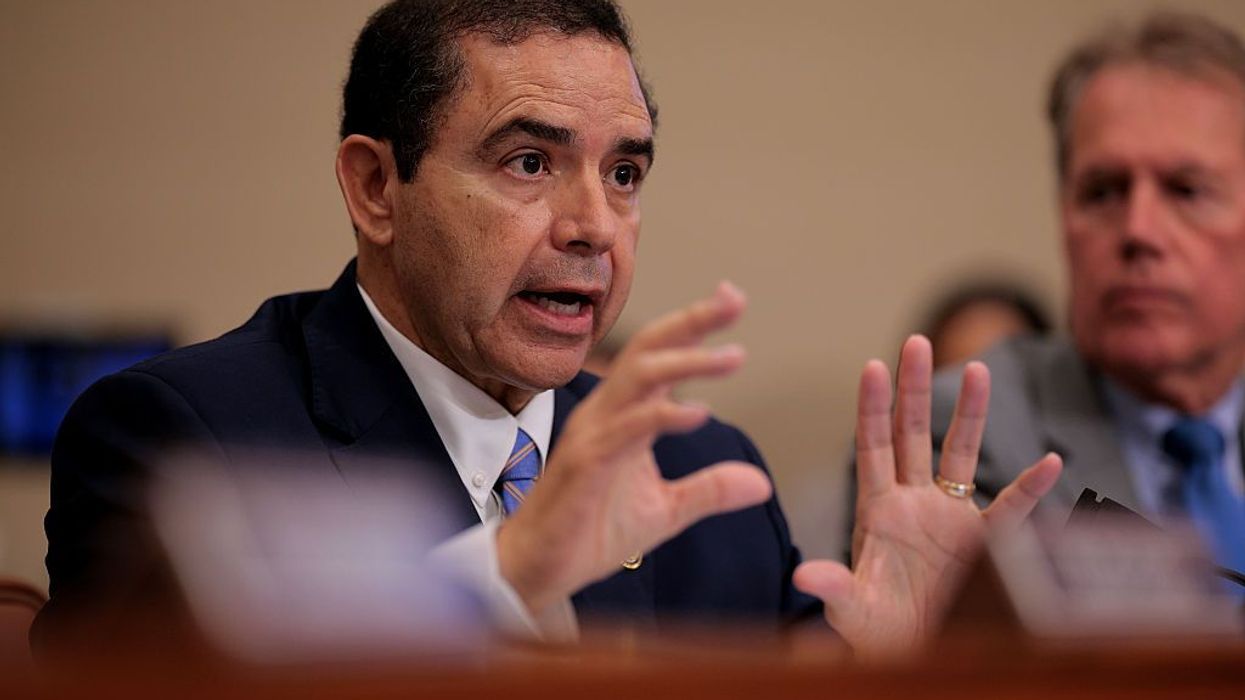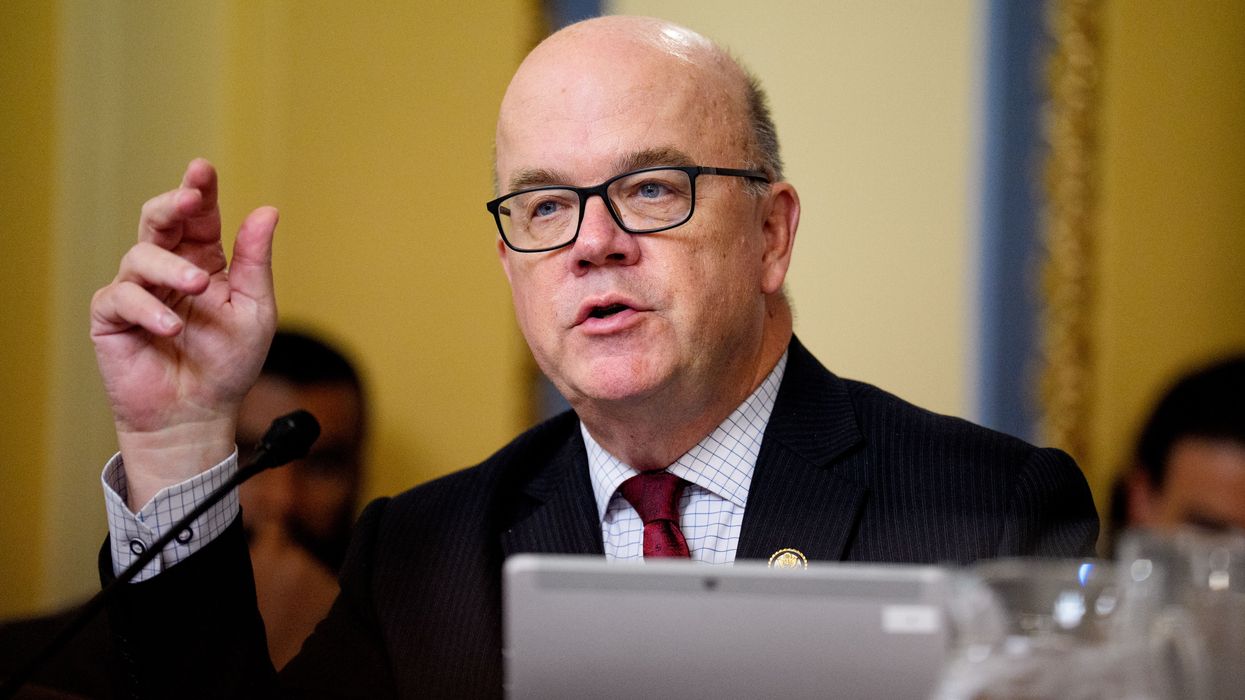December, 17 2008, 12:49pm EDT

Navy Sinks Billions into Unneeded Spare Part
WASHINGTON
The Pentagon continues to waste billions of dollars on unneeded spare parts, according to a new investigation into Navy purchasing practices that was requested by Senator Bernie Sanders (I-Vt.).
Despite repeated warnings about longstanding problems with the military's inventory management, $7.5 billion worth of unneeded parts were stashed in Navy warehouses annually, according to a new Government Accountability Office report.
The latest investigation covering a four-year period ending in 2007 was conducted at the request of Sanders and Representative Solomon Ortiz, chairman of a House Armed Services subcommittee on military readiness.
"At a time when the nation has a $10.6 trillion debt, we simply cannot afford the continuing uncontrollable waste across the federal agencies," Sanders said.
"It is unacceptable that the Navy has $7.5 billion in unnecessary spare parts stacked up in its warehouses," Sanders added. "In fact, the Navy has ordered millions of dollars in spare parts that have not yet been delivered to its warehouses, but are already marked for disposal. This is both unbelievable and outrageous. Unfortunately, this is not just the Navy, but something the entire military has to address. I hope the next administration will take the issue seriously."
The bloated inventories were so big that the parts on hand in some cases exceeded the actual expected demand for the items for decades to come, according to the report.
In addition to the hefty price tag for the unnecessary parts, the Navy shelled out $18 million just to store the excess parts.
Some items, the GAO report added, continued to be purchased based on projections that were calculated when a part was originally built without ever adjusting for real-life experience. For example, the demand for seven out of nine parts for a submarine sonar system first ordered in 1991 never materialized, but the parts are still held in the Navy inventory.
The Navy agreed had agreed to fix the problems highlighted by GAO before, but failed to take the recommended corrective measures. As a result, the report said, the Navy continues to have "significant levels of secondary inventory exceeding current requirements, including a substantial amount of inventory that had no projected demand."
Without acting on the cost-saving recommendations, the report added, "the Navy will likely continue to purchase and retain items that it does not need and then spend additional resources to handle and store these items."
One result of squandering money on excessive spare parts is that "these funds are not available to meet other military needs," the report concluded. Sanders said the waste by the military is more egregious at a time when investments in rebuilding roads and bridges and schools are desperately needed as part of an economic recovery package to help pull the nation out of a steep recession.
The report is the latest in a series of audits to spotlight costly waste in the military procurement process at the Pentagon. Last September, the GAO calculated that more than half of the Air Force's secondary inventory, with a total average value of $31.4 billion, was not needed to support service requirements.
In fact, for years the GAO has exhorted the Pentagon to provide incentives to reduce purchases of unneeded on-order inventory, conduct a comprehensive assessment of unneeded inventory items on hand, and to take measures to address fluctuations in demand that produce these huge inventories.
Sanders has proposed creation of a panel to root out Pentagon waste. With other freshmen senators, he introduced legislation inspired by former Senator Harry S. Truman. In 1940, the future president became chairman of the Senate Special Committee to Investigate the National Defense Program. In the course of World War II, more than $15 billion in unnecessary and fraudulent defense spending was identified.
To read the GAO report, click here.
LATEST NEWS
Trump Admin Threatens Blue State SNAP Funds Unless They Turn Over Recipient Data
"Why is the Trump administration so hellbent on people going hungry?” asked New York Gov. Kathy Hochul, whose state has nearly 3 million food stamp recipients.
Dec 03, 2025
The Trump administration is threatening to strip away funds used to provide food assistance to poor Americans in Democrat-led states beginning next week, unless they provide information identifying who receives benefits.
At a Cabinet meeting on Tuesday, US Secretary of Agriculture Brooke Rollins said states would be denied the ability to access billions of dollars that Congress has appropriated to administer the Supplemental Nutrition Assistance Program (SNAP), unless they provide the federal government with personal information—including names, Social Security numbers, addresses, birth dates, and immigration status—of aid recipients.
SNAP provides Americans with incomes below 130% of the federal poverty line with roughly $6 per day on average to pay for food. Roughly 1 in 8 Americans—over 42 million—rely on the program. Rollins originally ordered states to provide this information to the government in May in what she said was an effort to verify the eligibility of those receiving benefits.
“As of next week, we have begun and will begin to stop moving federal funds into those states until they comply and they tell us and allow us to partner with them to root out this fraud and to protect the American taxpayer,” Rollins said Tuesday.
As of Tuesday, 29 states had provided the information, but many Democratic ones, including New York and California, had not. Rollins claimed that those states were choosing to "protect illegals, criminals, and bad actors over the American taxpayer.”
While the benefits paid to individuals would not be cut, states that don't comply stand to lose millions of dollars that they use to administer the program, which could delay benefits and force them to push some recipients off the program.
In its efforts to enact sweeping cuts to social safety net programs like SNAP, Medicaid, and Affordable Care Act insurance subsidies, the Trump administration has often fallen back on false claims that the services are being abused by ineligible people, including undocumented immigrants.
"Undocumented immigrants are not eligible to receive federal benefits under [SNAP]," explained Melissa Cruz of the American Immigration Council in November. "However, SNAP benefits are provided to households rather than individuals. If, for example, the head of a household is undocumented, they may still apply for SNAP benefits for their U.S. citizen children. But benefits are calculated based on the number of eligible people in the household, so the assistance would only cover the US citizen children—not the entire household.”
Rollins has elsewhere claimed that 186,000 deceased individuals receive benefits, while 500,000 individuals receive duplicate benefits, citing it as evidence of fraud. But as the current US Department of Agriculture website explains, these are the result of administrative efforts—such as states being slow to update eligibility rolls when recipients die or move to a new state. The USDA says that over the past 15 years, it has reduced the prevalence of illegal benefit trafficking in SNAP from 4% to 1%.
The USDA's order comes on the heels of the largest cut to SNAP in the program's history. The One Big Beautiful Bill Act, signed by Trump in July, cut funding to the program by roughly 20%.
Like with other programs, Rollins suggested on Tuesday that the goal of USDA's order was not simply to root out "fraud," but to further slash Americans' benefits: “As [former President] Joe Biden was working to buy an election a year ago, he increased food stamp program funding by 40%, so now... we continue to roll that back,” she said.
Rollins' 40% claim is also an exaggeration; according to an estimate by the Cato Institute last month, the spending increase was actually about 21%.
Like President Donald Trump's previous efforts to deny SNAP benefits to states during this fall's government shutdown, the USDA's order has run into legal hurdles.
After 22 states sued, a federal judge in San Francisco, Maxine Chesney, issued a preliminary injunction in October blocking the administration from demanding the data.
Chesney found that these actions likely violated the SNAP Act, which says that states are only allowed to release data related to administering the program. She also found that states would likely succeed in their argument that the administration might illegally share the data with other agencies, like the Department of Homeland Security, to aid mass deportation efforts.
Gina Plata-Nino, the SNAP director at the nonprofit Food Research and Action Center, told the Washington Post that the USDA's demands for this data were likely illegal.
“The federal law restricts USDA access to this,” Plata-Nino said. “The agency has always relied on anonymized data or small samples to perform oversight… Them saying, ‘We’re going to go ahead and remove this funding,’ it’s just so unprecedented.”
The Democrats on the House Agriculture Committee accused Trump and Rollins of "illegally threatening to withhold federal dollars."
"SNAP has one of the lowest fraud rates of any government program, but Trump continues to weaponize hunger," they said.
New York Gov. Kathy Hochul (D), whose state had nearly 3 million food stamp recipients as of 2024, asked why Trump was again threatening to strip the state of SNAP funding after his previous attack on the program during the shutdown.
"Genuine question: Why is the Trump administration so hellbent on people going hungry?” Hochul asked.
Katie Bergh, a senior policy analyst who focuses on SNAP and other antipoverty programs at the Center on Budget and Policy Priorities, noted that while cutting funds, Trump has also scrapped the nation's most comprehensive food insecurity survey, the Household Food Security Report, which would measure the effects of those cuts on Americans.
“The Trump administration’s approach,” Bergh said, “has been enacting the deepest cuts to food assistance in history, needlessly disrupting SNAP benefits during the government shutdown, and terminating the most reliable measure of food insecurity to hide the consequences of those decisions.”
Keep ReadingShow Less
‘This Is Disgusting’: Trump Pardons Henry Cuellar After Bribery, Money Laundering Charges
"Henry Cuellar, the last anti-choice Democrat in the House, sold out his own community for bribes from a foreign government and oil corporation," said Sunrise Movement in condemning the Trump pardon.
Dec 03, 2025
President Donald Trump on Wednesday announced that he was pardoning Democratic US Rep. Henry Cuellar, who was indicted by the Department of Justice in 2024 on charges of bribery, conspiracy, and money laundering.
In justifying the pardon, Trump baselessly claimed that the Texas lawmaker was the victim of vindictive prosecution by former President Joe Biden in supposed retaliation for Cuellar's criticisms of Biden's immigration policies.
"Henry, I don't know you, but you can sleep well tonight," Trump wrote at the end of his pardon announcement. "Your nightmare is finally over!"
According to federal prosecutors, Cuellar and his wife, Imelda Cuellar, engaged in a corrupt scheme that involved taking $600,000 worth of bribes from a fossil fuel company owned by the government of Azerbaijan in exchange for desired policy outcomes.
"The bribe payments were laundered, pursuant to sham consulting contracts, through a series of front companies and middlemen into shell companies owned by Imelda Cuellar,” prosecutors alleged in their indictment. “In exchange for the bribe payments to Imelda Cuellar, Henry Cuellar agreed to perform official acts in his capacity as a member of Congress, to commit acts in violation of his official duties, and to act as an agent of the government of Azerbaijan."
As noted by congressional reporter Jamie Dupree, Cuellar is the twelfth current or former member of Congress whom Trump has pardoned, and is the first one to receive a pardon without having been criminally convicted.
Cuellar is also just the second current or former Democratic member of Congress to receive a pardon from Trump, who also pardoned former Illinois Gov. and ex-US Rep. Rod Blagojevich, who was found guilty in 2011 on multiple corruption charges related to his attempt to sell a US Senate seat that had been vacated by Barack Obama after his election to the presidency in 2008.
Some progressives expressed revulsion at Trump's pardon of Cuellar, one of the most conservative members of the House Democratic caucus who has nonetheless been defended by party leadership despite criminal charges leveled against him.
"This is disgusting," wrote Sunrise Movement's official X account. "Henry Cuellar, the last anti-choice Democrat in the House, sold out his own community for bribes from a foreign government and oil corporation. Then he cozied up to Trump for a pardon while the Democratic establishment stood by and watched."
Melanie D'Arrigo, executive director of Campaign for New York Health, speculated that Trump pardoned Cuellar as a reward for stifling past progressive policy ambitions.
"Henry Cuellar is part of the Problem Solvers Caucus—a 'bipartisan' group where the Democrat members repeatedly undermine the Democrats' agenda to help Republicans, while taking campaign donations from Republican billionaires," she wrote. "This is a 'thank you.'"
Emma Vigeland, cohost of "The Majority Report" talk show, wondered if Trump had worked out an explicit quid pro quo with Cuellar ahead of the pardon.
"Cuellar is an anti-abortion Democrat who will likely switch parties now that Trump has gotten him out of a dozen bribery and money laundering charges," she wrote.
However, the Texas Tribune reports that Cuellar on Wednesday filed to run for reelection as a Democrat, which for now casts doubt on him switching parties as a condition of getting pardoned.
Keep ReadingShow Less
Congressmen Unveil Bipartisan War Powers Resolution to Block Trump War on Venezuela
"No conflict for oil, no armed intervention, no war with Venezuela!" said Rep. Jim McGovern.
Dec 03, 2025
As President Donald Trump and Defense Secretary Pete Hegseth face mounting fury over their deadly boat bombings and threats against Venezuela, a trio of US lawmakers on Tuesday introduced a bipartisan war powers resolution aimed at blocking any attacks on the South American country not authorized by Congress.
"Donald Trump claimed he would put America first—instead, he's trying to drag us into an illegal war in Venezuela," said Rep. Jim McGovern (D-Mass.), ranking member of the House Rules Committee and co-chair of the Tom Lantos Human Rights Commission, in a statement. "Whatever this is about, it has nothing to do with stopping drugs."
"Trump just pardoned the former president of Honduras, who was convicted of sending cocaine to the US. And... he pardoned a guy who brought fentanyl in from China via the dark web," he highlighted. "To me, this appears to be all about creating a pretext for regime change. And I believe Congress has a duty to step in and assert our constitutional authority. No more illegal boat strikes, and no unauthorized war in Venezuela."
So far, congressional efforts to prevent Trump from waging war on Venezuela and continuing to blow up boats the administration claims are running drugs in the Caribbean and Pacific—the US military has attacked 22 vessels and killed at least 83 people—have not been successful.
On Tuesday, while answering questions about reporting that the first vessel attack on September 2 involved a double-tap strike that killed survivors, the president signaled he will soon pursue long-threatened attacks on Venezuelan soil.
"We're going to start doing those strikes on land too," Trump said. "The land is much easier" than bombing boats, "and we know the routes they take," he continued, referring to alleged drug traffickers.
Meanwhile, Rep. Joaquin Castro (D-Texas), a cosponsor of the new resolution and ranking member of the House Foreign Affairs Committee's Western Hemisphere Subcommittee, said that "President Trump has undermined our alliances in the Western Hemisphere, openly interfered in elections, conducted illegal strikes on boats in the Caribbean, and threatened foreign military intervention."
"He has put our country at the brink of a war with Venezuela without a debate or vote in the Congress," Castro said of Trump. "This resolution will ensure that every member of the House is on the record about sending service members to a war that Americans do not want."
Castro and McGovern are spearheading the new push with Rep. Thomas Massie (R-Ky.), who previously joined with Democrats to force the House's November vote on releasing federal files related to deceased sex offender Jeffrey Epstein, Trump's former friend. The bill is also backed by three California Democrats: Reps. Sara Jacobs, Sydney Kamlager-Dove, and Ro Khanna.
"The Constitution does not permit the executive branch to unilaterally commit an act of war against a sovereign nation that hasn't attacked the United States," Massie stressed. "Congress has the sole power to declare war against Venezuela. Congress must decide such matters according to our Constitution."
Keep ReadingShow Less
Most Popular


